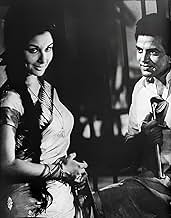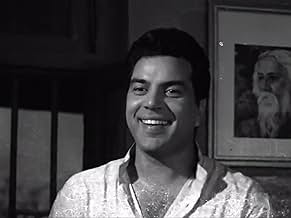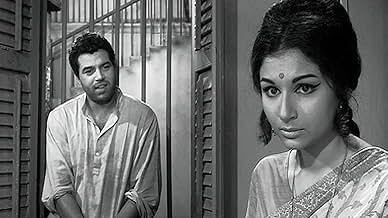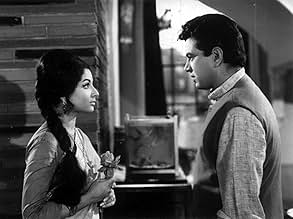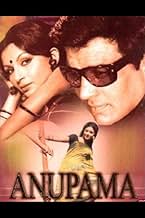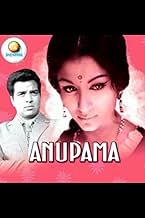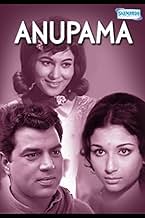Füge eine Handlung in deiner Sprache hinzuMohan Sharma (Tarun Bose) is a workaholic whose life changes dramatically after his wife dies giving birth to their daughter Uma (Sharmila Tagore). He despises the daughter by day, and adore... Alles lesenMohan Sharma (Tarun Bose) is a workaholic whose life changes dramatically after his wife dies giving birth to their daughter Uma (Sharmila Tagore). He despises the daughter by day, and adores her when drunk at night. Uma's life gets better as she comes of age and has a relationsh... Alles lesenMohan Sharma (Tarun Bose) is a workaholic whose life changes dramatically after his wife dies giving birth to their daughter Uma (Sharmila Tagore). He despises the daughter by day, and adores her when drunk at night. Uma's life gets better as she comes of age and has a relationship with a sensitive poet, Ashok (Dharmendra), who slowly brings her out of her shell.
- Auszeichnungen
- 1 Gewinn & 4 Nominierungen insgesamt
- Anita Bakshi 'Annie'
- (as Shashikala)
- Suresh Bakshi
- (as Bharadwaj)
- Moses
- (as David)
Empfohlene Bewertungen
Anupama is the story of a shy and retreating girl who grows up with the stigma of guilt, and her father's reproach and blame for having lost her mother during childbirth. It's a poignant journey of how she overcomes her own guilt and steps out of her father's overbearing shadow.
Tarun Bose - another unsung character actor from Hindi cinema - plays Sharma, an affluent businessman who has married late but deeply loves his wife. When she dies in childbirth, he blames the newborn daughter Uma for having separated him from his only joy in life. She grows up as a timid young girl who pines for her father's affection, feels the guilt of her mother's demise and is barely able to express herself as a result. Indeed her first words in the movie are almost an hour into it, in a lilting song amidst nature.
Sharmila Tagore, performs exquisitely as the daughter Uma, and despite having very few words to say, truly embodies the repressed, melancholy character, especially with her eyes that express all her emotions. Of course it helps that she is so beautiful.
The scenes between father and daughter are poignant, and are sensitively handled. Deep inside, Sharma does love his daughter, but it shows only when he is drunk, and not in his senses.
Hindi cinema has produced many excellent actors who are grossly underrated, and none more so than Dharmendra, who is not really remembered today for some of his sensitive portrayals, and his flair for comedy. Here he plays Ashok, a writer by profession from a modest background whose keen mind is quick to notice Uma's angst. Which also attracts the two together.
Helping the plot race along - despite the melancholy theme, there's never a dull moment in the screenplay - are Shashikala who plays Annie (or Anita) - an effervescent tomboy and a complete anti-thesis of Uma's character- and a young Deven Verma who plays Arun, her love interest and a childhood friend of Ashok.
There's also David - a Hrishikesh Mukherjee regular - provides great comic relief as Sharma's cheerful friend Moses. He has the best line in the movie. Translated from Hindi, "Death is great fun. The dying person doesn't know when it will happen, and everybody else cries." This has to be one of David's finest performances - he jokes, dances with Shashikala, and generally brings the house down with his pearls of wisdom.
An unspoken love develops between Ashok and Uma, that threatens to die unrequited. Ashok understands the father's grief, but resents his ignorance and neglect of his daughter. The song 'Ya dil ki suno..' sung by the peerless Hemant Kumar, who also scores the music, is heart-rending. This song alone is worth the price of the movie. Written by Kaifi Azmi, It poetically describes the insensitivity of the father: "what a flower has bloomed in nature, the gardener has no love for it".
Can Uma really overcome her internal barriers and take the leap to be with Ashok? Does she really have the strength to break free from emotions of both love and terror for her father? Despite a predictable ending, the movie still surprises in the end.
Modern day directors can learn a lot about how to balance emotional content with sparkling comedy. And aided by excellent performances all round, 'Anupama' makes for a memorable experience.
Although the movie takes its own time to develop the characters thoroughly and although you wouldn't expect anything less from Hrishikesh Mukherjee in that regard, I did feel that the movie could have been shortened a little bit. Also, Shashikala's role seemed a little exaggerated.
In general, the movie is a gem and I wish viewers all over the world could be introduced to such Hindi classics for a true appreciation of the range of "Bollywood" movies over the years.
The thing that strikes out about the film is how well it comes together as a whole -- the cinematography, screenplay, the music, the editing and the acting. To the credit of Mukherjee and Roy alike, the film epitomizes the Black & White class drama that so strongly influenced Indian popular cinema in the post-independence era. I cannot recommend the film enough.
The bad: 1. Shashikala played a most exaggerated character and got annoying after a while, plus she acted 18-20 years old and was clearly an older woman.
2. The story was melodramatic and exaggerated.
The good: 1. It is a Hrishikesh Mukherjee film - loaded with pluses.
2.Sharmila was awesome as Uma - the traumatized silent girl; she was beautiful and extremely competent at showing emotions without words.
3.Dharam was best in the idealist roles. Here he is just so good - often seen in a singlet with holes, and never stylish but always full of his own inimitable style.
4. Tarun Bise, David, Deven Varma all did a good job.
5. The music was fantastic - Bheegi Bheegi fiza, Yaa dil ki suno duniya waalon, Aisi bhi baatein.
On balance a good film, watchable for the lead pair, the songs, but surprisingly not one of the best from the maestro.
Wusstest du schon
- WissenswertesKuch Dil Ne Kaha Kuch Bhi Nahin. Sharmila Tagore had turned up for the song's shoot in Mahabaleshwar at 5 am in full makeup and with her hair styled in a bouffant. Director Hrishikesh Mukherjee disapproved of the bouffant and told the actress that it didn't go with her character. He gave in when she insisted on keeping it. Later, however, Tagore regretted her appearance in the song and wished that she had listened to the director. [
- VerbindungenFeatured in Guddi (1971)
- SoundtracksYa Dil Ki Suno Duniyawalo
Sung by Hemanta Mukherjee (as Hemant Kumar)
Music composed by Hemanta Mukherjee (as Hemant Kumar)
Lyrics by Kaifi Azmi
Top-Auswahl
- How long is Anupama?Powered by Alexa
Details
- Laufzeit2 Stunden 28 Minuten
- Farbe
Zu dieser Seite beitragen


